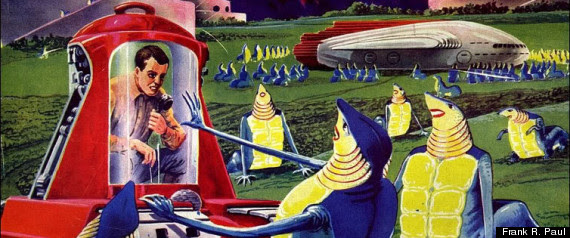Sightings of alien spaceships are up, and Congress is looking into the issue. If the universe is infinite and expanding, then how could it possibly be that Earthlings are the only life in it? The government must be holding something back, Roswell and Area 51 are real, and we should be preparing ourselves for first contact.
Science fiction, of course, has made millions on creatures from outer space - ghoulish, grasping, oozing things - and only a few writers like Arthur C. Clarke, have imagined something more subtle, an intelligence that suffuses the universe, a God-surrogate that has always existed and remains to be known; or Ray Bradbury who imagined worlds not all that different from ours but where it rains all the time or life is a perpetual circus.
Yet the question is a good one - why should Earth be the only inhabited place in the universe, and human intelligence the only one? God could not possibly have been so limited and selective; and he must have peopled space with other beings, perhaps more evolved and intelligent than us.
The Bible, for example, tells of God's frustration with the world he created; so much so that he destroyed in once with The Flood, tried a second time in Sodom and Gomorrah, and showed his intentions to do it one, final time, in the Book of Revelation. It would be logical to assume that he tried in other places to get it right.
If other worlds were in fact created by God, suggest Christian theologians, wouldn't they be ruled by Yahweh and Jesus? Either God is absolute, one and indivisible, universal, and timeless or he isn't. There can be no straggling the doctrinal fence.
Such conviction worries many Christians. What if aliens have no idea of God, gods, or religion? What would that do to fundamentalist beliefs about divinity? Give lie to the whole idea of salvation?

Other Christians believe that aliens will be no different from the American and African savages saved by missionaries and evangelists - wandering in the spiritual darkness until God is revealed.
Muslims seem to have the right perspective. To suspect that out of the 124,000 prophets sent by Allah for guidance in the world as mentioned in the prophetic tradition, quite a few might have been sent to non-human brethren, and when they arrive, good Muslims will try to search for common elements between Islam and alien belief.
As emphasized by many Muslim writers God is described in the Quran as the Lord of the Worlds (plural); and one may surmise that debate and even proselytizing will follow suit, encouraged by the fact that according to the Quran, all living creatures will be held accountable before God on the Day of Judgement.
The rationalization of godless aliens gets very Baroque. Another possibility suggests one is that God incarnated multiple times, sending a version of himself down to save each inhabited planet separately. However, based on the best guesses of how many civilizations one might expect to exist in the universe and how long planets and civilizations are expected to survive, God's incarnations would have to have been made in about 250 places simultaneously at any given time, assuming an incarnation took about thirty years.
In the most unlikely scenario, the first aliens that visit Earth might have long since been saved, and are examples of post-sin evolution. While Jesus and his disciples never promised a heaven on Earth but assured only an after-death salvation, perhaps aliens took their words more to heart, followed the lessons of the parables, walked in the way of the Lord, reformed themselves, defeated Satan, and transformed themselves into a Christian Utopia.
But what if God can save alien races without Jesus? What does that do to the notion of the uniqueness of his earthly divinity? It will be hard for Christians to accept the fact that Christianity is but an incidental occurrence - important but simply one of billions of configurations.
Worse yet is the threat to the doctrine of sin. The existence of sin, the importance of suffering, and the redemptive power of grace are all tenets of Protestant Christianity. Yet what if aliens are not humanoid at all and exist in some non-corporeal form, perhaps just as an intelligence suffused, as Arthur C. Clarke imagined, throughout the universe and which makes itself known to lesser races from time to time?

While this debate may seem silly to observers concerned more with the practical benefits that might accrue from contact with a superior intelligence or with the dire consequences of a hostile, predatory alien race than any question of salvation, it is far from trifling to Christians who know that their very Earth-centered story of Jesus might be thrown into question or even dismissed entirely.
Whatever script is followed, one thing can be sure - given the importance of religion in the world, human beings will take great pains to justify it. The idea of a godless, benign intelligence is simply not possible; and if we are to be visited, let them come with all guns firing.





No comments:
Post a Comment
Note: Only a member of this blog may post a comment.